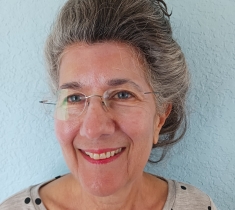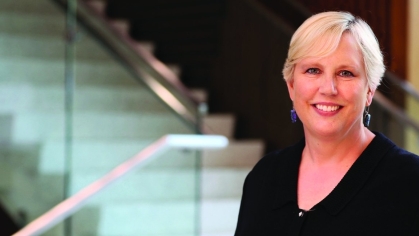By Melissa Kvidahl Reilly

It’s easy for Gail Scagnelli Maurer to remember when she first decided to become a social worker. As a teenager, one of her friends had a troubled home life and felt very misunderstood and rejected. He stole a car, skipped school, and was on his way to New York City as a runaway. Maurer was right behind him. “I didn’t know why at the time, but I felt compelled to help him any way I could,” she recalls. “I thought the best thing to do was to also run away from home and help him in his trouble and unhappiness.” She was packing her bags to leave when her mother found her and delivered a clear message: If you want to help others, this is not the time or place to do so, she said firmly. Go to school and learn to do it right by becoming a social worker! “That was all it took for me,” Maurer says. “The seed was planted.”
Fast forward a few years. Maurer earned an undergraduate degree in sociology and was working for the Virginia Department of Corrections as a probation and parole officer. “I liked the diversity and flexibility of the work and helping others,” she says. “I had an office full of artwork and things that some of my clients made for me to express their gratitude. It was a fulfilling experience, but I had reached a point where I wanted more for my career.”
She returned to her native New Jersey to earn her MSW from Rutgers University’s School of Social Work. She also took advantage of a special program offered at the time to become a Licensed Nursing Home Administrator (LNHA), a move that would ultimately land her a job as one of the only social workers with the United States Air Force’s Medical Services Corps (MSC). “Generally, the Air Force does not accept social workers as MSCs, as they typically only accept candidates with business and public administration degrees,” Maurer says. “In my case, I was the only social worker who was accepted because the Air Force recognized the LNHA as comparable to other administrative degrees.” It was the beginning of a 20-year military career, which culminated in her retirement as a Lieutenant Colonel in 2006.
This path wouldn’t have been possible, she says, without the support offered by the School of Social Work. “I put myself through school—there was no one there to help me out financially,” she says, but she found support through the school’s work-study program, a Pell Grant, and various internship opportunities. “I doubled up on courses so that I could complete all of the requirements in less than two years,” she says. “Time was money.”
As part of the Air Force’s MSC, Maurer held a number of roles in military health care at home and abroad, both as an active duty and reserve officer. During this time, she decided to return to Rutgers for her doctoral degree in social work. “Again, financing such an endeavor seemed out of my reach for a number of reasons,” she recalls. “But once again, Rutgers came to the rescue.” She was offered a research assistantship at the Institute for Health, Health Care Policy and Aging Research (then called the Institute for Aging and Research), a Rutgers scholarship, and a Fahs-Beck Fund for Research and Experimentation grant.
Her research, which focused on women with HIV/AIDS, gave Maurer even more clinical experience. She won the Dean’s Dissertation Award for this pioneering work, which focused on women who faced dying as well as the challenge of planning for their children’s futures. “I was deeply moved by this experience,” she says. “I learned a lot about my life and myself in the process.” Soon after, she started working in hospice around the country, while also serving in the Air Force reserves as a health care administrator, before finally landing at the Veterans Administration where she oversaw direct practice programs for veterans.
Shifting Focus
Though she achieved many of her goals, Maurer says there was still something pulling on her heartstrings: somehow combining her passion for clinical social work with her love of art. “I thought the combination could help others realize their strengths more effectively, and also be a fun and relaxing outlet,” she says.
So after attending Prescott College in Arizona to become an expressive art therapist, she opened a solo clinical practice for older adults on Medicare, focused on using expressive art therapeutically. “Many clinicians don’t like to deal with accepting Medicare because it doesn’t pay well and there is a lot of red tape involved,” Maurer says. “That is unfortunate, because there is a great need for mental health care in the later years.” In the spirt of true social work, Medicare is
the only insurance Maurer accepts at her Arkansas practice.
Supporting the Next Generation of Social Workers
If you ask Maurer, she’ll tell you she’s reached a moment in her life where she’s reflecting back on her career and also considering the future of social work. So it’s no surprise she quickly realized she wants to give back and pay it forward. It was important for her to do so at Rutgers for a few reasons. First, it’s an institution that made a significant difference in her life and journey as a social worker, and one that helped her meet and overcome financial hardships along
the way. But it also stands out to her as an institution with a diverse community, helpful and encouraging faculty, and meaningful work and research opportunities—the kind of school that’s essential in shaping the next generation of social workers and providing access to the same opportunities she had as a student.
“The opportunities afforded to me by Rutgers made a major difference and enabled me to have a strong career life in helping others,” she says. “Without that, I’m not sure how my life would have turned out.”
Take it From Her
For Maurer, being a social worker has been a lifelong calling. One driving force at the core of it all has been the values and ethics associated with the profession—something she hopes will guide the next generation as their north star, even when the road is difficult. “Social workers are people who can work through obstacles to make a difference and, if you are going to be a social worker who makes a difference, you are going to have to learn how to be a cause fighter and create change,” she says. “A social worker never stops questioning what others say is right. They are advocates for both themselves and others, and they care deeply about making the world a better place.” Here are her words of wisdom for today’s students.
DON’T BE AFRAID OF AN OPPORTUNITY. Twists and turns are all part of growth, and taking a chance on something out of the ordinary can be an important step in achieving your overall goal.
CAREERS AREN’T LINEAR. “It will not always be a clear shot from point A to point B,” she says. “Sometimes you need to take a break and do something else, and resume what you’ve been doing at a later time.” This could take the form of a new job or even focusing on another area of life.
REMEMBER YOUR “WHY.” Sometimes, dealing with difficult organizations, policies, politics, and personalities can become frustrating. “Never forget why you chose social work as your career,” she says. “Social work is a calling and sometimes you’ve got to fight for what’s right.”
IT’S OK TO MOVE ON. What seems like a setback now can later reveal itself to be a stepping stone…or even a launch pad.
SOCIAL WORK IS A CAREER WITH MANY OPTIONS AND OPPORTUNITIES. “It doesn’t place you into one little corner of the world for the rest of your life,” Maurer says. “There is always something else you can do and explore. It is one of the most flexible, diverse, and interesting careers around. Don’t let yourself get bored. Think outside the box!”



